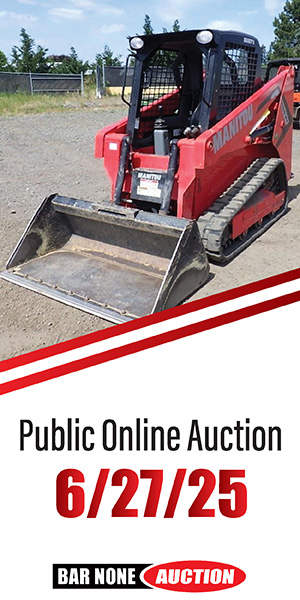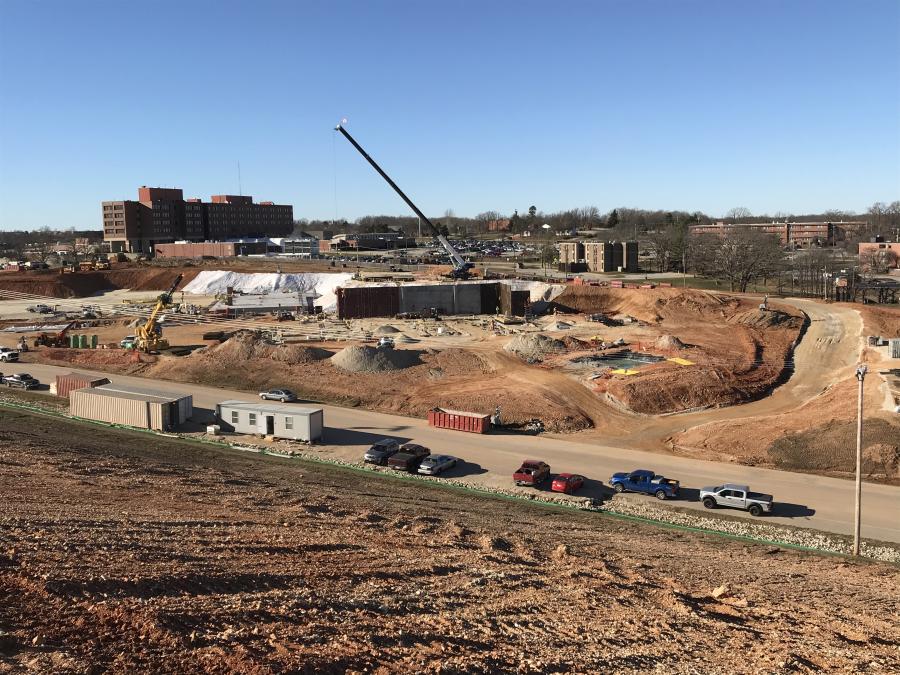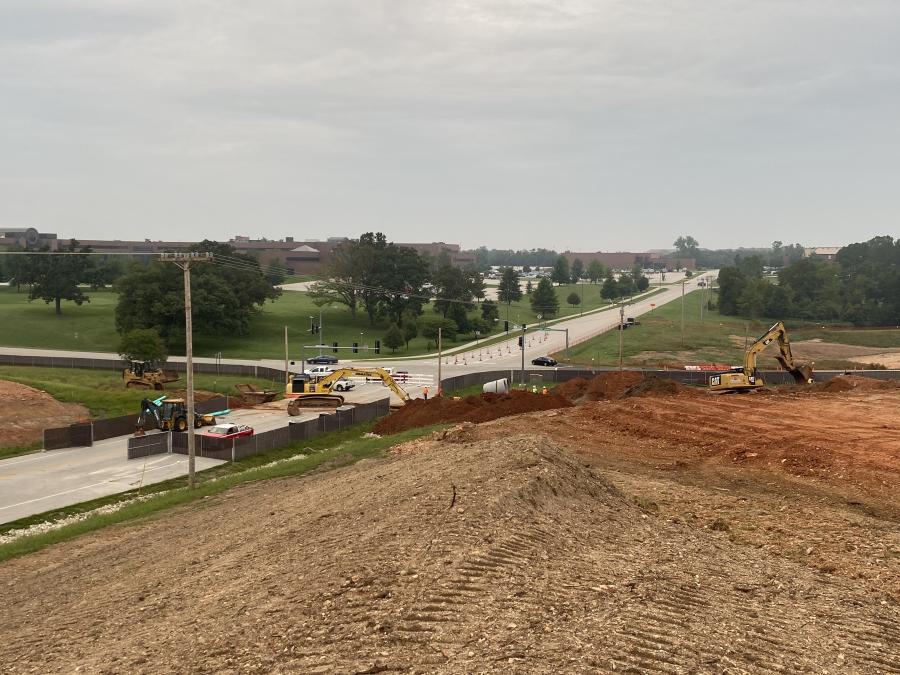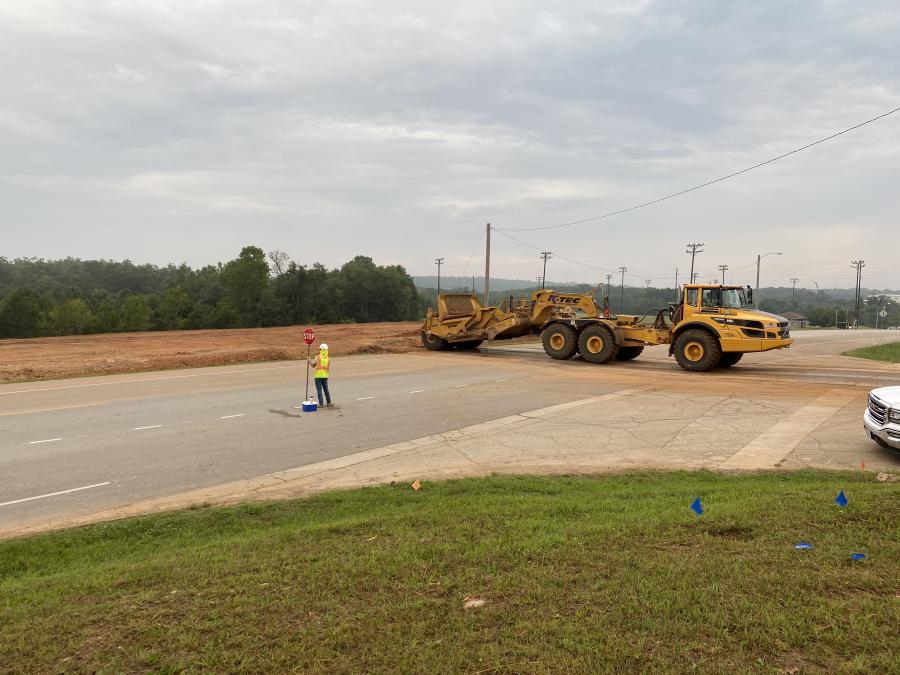JE Dunn Construction Company broke ground last June for the $295,974,160 design-build replacement of the U.S. Army Corps of Engineers (Kansas City district) Fort Leonard Wood Hospital.
JE Dunn Construction Company broke ground last June for the $295,974,160 design-build replacement of the U.S. Army Corps of Engineers (Kansas City district) Fort Leonard Wood Hospital, an initiative expected to be delivered in fall 2024.
The project at the U.S. Army Base near St. Robert, Mo., and funded by Department of Defense military construction funds, was awarded to JE Dunn in August 2019. As the construction agent for Defense Health Agency, the USACE's Kansas City district is responsible for the design, construction and delivery of the hospital.
The 52-acre site for the General Leonard Wood Army Community Hospital (GLWACH), located within the installation's main post. It is northeast of the existing 450,000-sq.-ft. hospital built in 1965, which will be demolished, with renovation of the existing optical fabrication lab and improvements to the parking facilities, after the new hospital is delivered.
Paul Neidlein, JE Dunn's Midwest region president, said that the project will create around 4,000 construction jobs over the next four years.
Since June, efforts have concentrated on relocation and enhancement of site utility infrastructure, being done by LaClede Electrical Cooperative and Omega Pipeline LLC, and earth work and water/sanitary/storm sewer installation by Bloomsdale Excavating Co. (BLEX), whose efforts do not require the demolition of existing buildings and only a few utilities to be relocated.
"Work on a military base has to be precise, consistent and properly communicated to all parties involved," said Brandon Zehr, Bloomsdale's project manager. "Our earthwork and site utilities involve crossing public streets in which advanced notification and communication must be followed. As with most utility projects, we're navigating our way around existing utilities using as-builts provided by utility companies and engineering firms.
"Our project got kicked off in mid-June 2020 with installing a 66-inch storm sewer and 12-inch sanitary sewer — 15 feet deep — open cut through a public street over the course of 2.5 days by 24-hour shifts," he added. "Utility lines were installed and road was opened to traffic as scheduled. There are no soil or water issues at this time. Relict rock beds are present, and as planned, we are just now starting to get into this. Relict rock beds are generally leftover rock, while the remaining portions of rock layer has already weathered to the soils. These beds are irregular and vary greatly in depth and thickness."
Bloomsdale's scope of work is extensive, covering site clearing and demolition; erosion control; earthwork/grading (280,000 cu. yds. of dirt excavation); structural excavation; building excavating/backfill; subgrade stabilization (over-excavation with minus rock); installation of site utilities (storm, sanitary and water); construction of modular retaining walls; site concrete (sidewalk, curb and gutter, concrete paving); and topsoil import/final grading.
"The majority of our earthwork is being moved with Volvo A40 trucks with K-Tec scrapers," said Zehr. "It took approximately two weeks to get the equipment mobilized and field offices set up."
Site clearing took place prior to the March 31 to Nov. 1 Indiana bat season, which precluded operations due to the migration and protection of the habitat. Installation of the pipes started in mid-June. The majority of the excavation is being stockpiled on-site and near the site for future use by USACE.
"This is stakeless project and our curb machine — a GOMACO GT3300 paver — also runs on GPS, and you can put a sidewalk mold on it," said Zehr. "We came back in mid-June to fully mobilize our equipment and materials, and that's when we started the road crossing pipe work — the 66-inch and 12-inch sanitary pipe — that was our first order of business.
"On a good day we can excavate between 6,000 and 7,000 cubic yards," he added. "We're probably hauling a quarter mile to a waste site, where the material is being stockpiled. Once the waste area is full and we get closer to the south waste site, it will only be about 1,000-foot haul and we plan to excavate anywhere from 7,000 to 7,500 cubic yards a day."
Soil-wise, the site contains a mix of lean/back clay and very rocky dirt, and as noted, relic rockbeds, a kind of sandstone sporadically encountered within the site.
"You can hit a portion of sandstone that's 40,000 square feet and four feet deep and areas that are 100 square feet and eight foot in depth," said Zehr. "We're just starting into the rock now and we're learning as we proceed. We expect to encounter large amounts of rock in the coming weeks. This can be rough on the equipment — some of it can be ripped, but it does affect our production. Once you get to more solid sandstone where it requires more passes or cannot be ripped, that is when we'll use the hydraulic breaker and load it onto trucks."
Site preparation has BLEX establishing the areas where the various underground infrastructures — water mains, wastewater lines, storm water drains, and electrical, natural gas and communications lines — will be installed.
"We use GPS CAD files to help us locate the structural excavation, footings, walls, building outline and roads" said Zehr. "Some layout yards and material storage sites have been established and new ones will be created over the next couple of months."
The excavation is being forwarded by the use of K-Tec scraper pans attached to Volvo A45 trucks, Cat 349 and 336 dozers and Cat dozers — D7s, D8s and D9s, equipped with GPS systems.
"We're out to 1/10 of an inch tolerance for our grading and about 0.5 an inch tolerance on all the tops of our manholes and storm and sanitary structures," said Zehr. "We use GPS for all our grading and laying down of utilities. When we come up to grade it's more important in seeing where you're at, keeping track of your material, and how much is left to grade."
Zehr is assisted by Jeremiah Harris, general superintendent; Clayton Stockton, Travis Pogue, foreman; Gary Lalumandier, VP of operations; and Craig Drury construction manager. The preconstruction team consisted of Bill Priesmeyer, VP of preconstruction and Luke Mangrum, project engineer.
"We're looking to be dried up by the summer of 2022," said Tommy Turner, JE Dunn's senior project manager. "The building is structural steel with an architectural precast envelope.
BLEX expects that it will remove 292,000 cu. yds. of earth and rock.
Equipment-wise, BLEX is also using: John Deere rubber-tire loaders; Cat track loaders; Cat dozers; Cat and Komatsu excavators; Cat compactors; Cat motor graders; Volvo off-road trucks; K-Tec scraper pans attached to Volvo off-road trucks; a Superior broom street sweeper; and Cat skid steers.
"We have a full-time mechanic on-site and at this point we've been pretty lucky not to have any major breakdowns," said Zehr.
The firm purchases and rents equipment from Fabick CAT; Erb Equipment Company for John Deere pieces; and Rudd Equipment for Volvo pieces. In Missouri and Kansas, JE Dunn purchases and rents equipment from local and regional dealerships.
"We have long-lasting relationships and a lot of history with them," said Zehr.
JE Dunn has reserved some equipment already, which will be a mixture of company owned and rented pieces.
"We have strategies for cranes and other large pieces of equipment," said Turner. CEG
Irwin Rapoport
A journalist who started his career at a weekly community newspaper, Irwin Rapoport has written about construction and architecture for more than 15 years, as well as a variety of other subjects, such as recycling, environmental issues, business supply chains, property development, pulp and paper, agriculture, solar power and energy, and education. Getting the story right and illustrating the hard work and professionalism that goes into completing road, bridge, and building projects is important to him. A key element of his construction articles is to provide readers with an opportunity to see how general contractors and departments of transportation complete their projects and address challenges so that lessons learned can be shared with a wider audience.
Rapoport has a BA in History and a Minor in Political Science from Concordia University. His hobbies include hiking, birding, cycling, reading, going to concerts and plays, hanging out with friends and family, and architecture. He is keen to one day write an MA thesis on military and economic planning by the Great Powers prior to the start of the First World War.
Read more from Irwin Rapoport here.
Today's top stories




















